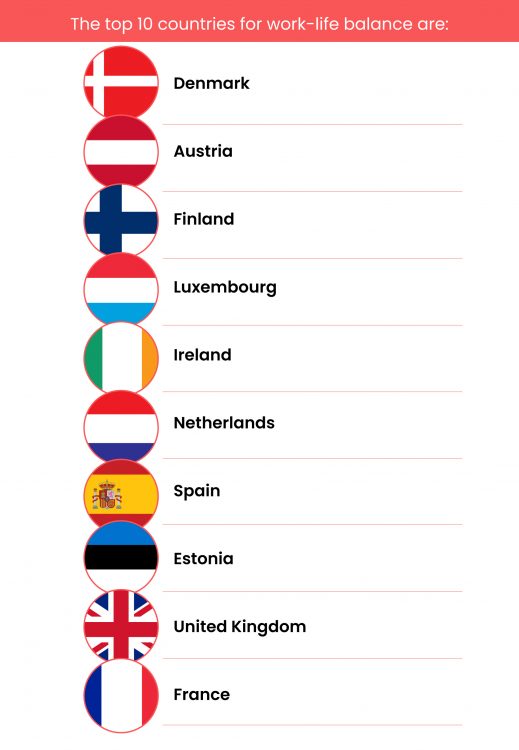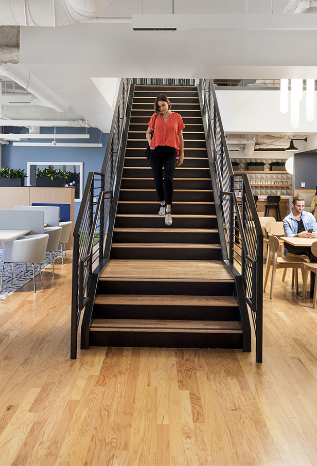Despite a shift to hybrid working and the four-day workweek growing in popularity, we all know what it feels like to be out of balance.
If you’ve ever eaten lunch at your desk, checked emails during annual leave or turned on your computer before your morning coffee, you’re probably guilty of overworking. With 44% of the world’s workforce feeling stressed and 60% emotionally detached from work in 2022, it’s no surprise that so many people find it hard to get the right balance. Fortunately, new research reveals there are still some countries with a healthier approach to working and living.
To identify them, we looked at average weekly hours, paid leave, average yearly income, paid maternity and paternity, and work and life satisfaction across 197 countries.
These places might be a good place to start if you feel like you need a change of scenery to find a better work-life balance.

Denmark has the best work-life balance in the world
Danes pride themselves on maintaining an excellent work-life balance, and overworking is generally discouraged. With a typical work week of around 34 hours and office days regularly ending at 4pm, people in Denmark have more time to devote to personal and family time.
Reports also show that because of the shorter work weeks, better balance and more support, 72% of Danish women have paid jobs, compared to the global average of 59%. The country has one of the highest work-life balance satisfaction scores, and one of the lowest rates of burnout in Europe.
Austrians work some of the lowest average weekly hours
Austrian employees enjoy one of the healthiest work-life balances in Europe. With a short work week of around 34 hours and has a high number of paid leave days. The country also gives working parents access to high-quality and affordable child care to promote better gender equality in the workplace.
The country also has low burnout rates of just 3.52% compared to the UK at 5%.
Finland has one of the highest work-life balance satisfaction scores
Finland has some of the most flexible working schedules in Europe. The country’s Working Hours Act gives most people the right to adjust their work start and finish times by three hours, giving people more power to adapt work to fit their lifestyles, rather than the other way around.
It also helps that Finland is one of the happiest countries in the world, ranking first in the UN Happiness Report five times in a row.
Best work-life balance ranked
| Rank | Country | Average weekly hours | Paid leave (days) | Avg. yearly income | Paid maternity leave (weeks) | Paid paternity leave (weeks) | Satisfaction: work-life balance | Satisfaction: General life |
|---|---|---|---|---|---|---|---|---|
| 1 | Denmark | 34 | 36 | £68,110 | 18 | 2 | 9 | 8 |
| 2 | Austria | 34 | 38 | £52,210 | 16 | 4 | 8 | 7 |
| 3 | Finland | 36 | 36 | £53,660 | 18 | 3 | 9 | 7 |
| 3 | Luxembourg | 37 | 37 | £81,110 | 20 | 2 | 8 | 7 |
| 5 | Ireland | 36 | 30 | £74,520 | 26 | 2 | 8 | 7 |
| 6 | Netherlands | 32 | 28 | £56,370 | 16 | 6 | 8 | 7 |
| 7 | Spain | 37 | 36 | £29,740 | 16 | 16 | 8 | 6 |
| 7 | Estonia | 37 | 39 | £37,009 | 20 | 4 | 8 | 6 |
| 9 | United Kingdom | 36 | 28 | £45,380 | 39 | 2 | 8 | 7 |
| 10 | France | 36 | 36 | £43,880 | 16 | 2 | 8 | 6 |
Some of the countries with the worst work-life balance include
- Sudan
- Gambia
- Samoa
- Lesotho
- Thailand
- Eritrea
- Papua New Guinea
- Palau
- Maldives
- Bangladesh
Improving your relationship with work
In the UK alone, more than 6 million people plan to quit their jobs in 2023, with 24% looking for a better work-life balance.
The good news is you don’t have to wait for better work-life balance to find you. There are some things you can do right now to help.
- Create and stick to a schedule
One of the best ways to improve your work-life balance is to create a schedule—and make sure you stick to it. Yes, there will always be last-minute deadlines and unexpected projects, but if you plan ahead as much as possible, you’ll be able to better manage your time. Telling your family or loved ones about it will help them hold you accountable.
- Set boundaries
If you want to have a healthy work-life balance, it’s important that you set boundaries between your personal and professional lives. If you work from home, do something to mark the transition from work to home life by walking the dogs or changing into different clothes, for example. Alternatively, work closer to home in a coworking or shared office, which means you can leave work behind at the end of the day.
- Make time for you
When was the last time you did something just for fun? Pursuing activities that make you happy can help reduce stress, improve your mental health, and boost creativity and productivity at work.
- Leave work apps on your work devices
Remove the company Zoom chat or email inbox from your personal devices and reduce the urge to check them after hours and on weekends.

